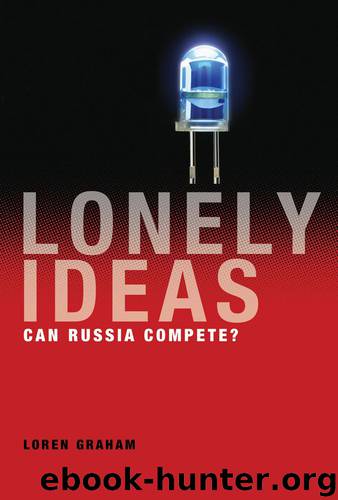Lonely Ideas: Can Russia Compete? by Graham Loren

Author:Graham, Loren [Graham, Loren]
Language: eng
Format: epub
ISBN: 9780262317399
Publisher: The MIT Press
Published: 2013-09-13T00:00:00+00:00
II What Are the Causes of the Problem?
How does one explain the pattern of impressive technological invention in Russia followed, again and again, by failure to develop and sustain that invention as a true innovation? We have seen that pattern in the arms industry, where Tula in the seventeenth century and again in the early nineteenth had one of the most impressive weapons-producing centers in the world; in railways, where in 1847 American engineers said the Alexandrovskii works in St. Petersburg were the most modern they had ever seen; in the electrical industry, where London and Paris in the 1870s were dazzled by the “Russian lamps” that illuminated their fashionable avenues; in aviation, where Russians before World War I built remarkable passenger planes; in Soviet industrialization, during which the world’s largest steel mills and hydroelectric plants were constructed; in biology, where Russians in the 1920s and early 1930s were leaders in the “new synthesis” of evolutionary biology and the new genetics that would lead elsewhere to spectacular technological development; in the semiconductor industry, where Russian engineers anticipated, in some cases, the world industry by almost a generation; in computers, where Russia built a very early electronic computer and one of the fastest in the world; in lasers, where Russians won the attention of the world with their pioneering research, garnering Nobel Prizes; and in space research, where Russians launched into orbit the first artificial satellite and the first human being.
In all these cases the early promise was not fulfilled. Instead, we have witnessed what can only be called massive failure in sustaining earlier excellence. Today, Russia is a minor player in the world high-technology market. Once again, Russian leaders are forced to repeat what their predecessors from Peter the Great on have proclaimed: Russia must modernize its industry.
No other country in the world displays this pattern of intellectual and artistic excellence and technological weakness to the same degree as Russia. It is a phenomenon of world significance that calls for explanation. This pattern has determined the fate of Russia as a nation, not only consigning it to backwardness but also providing the excuse for authoritarian government, from Peter the Great to Stalin to Putin. Russia’s retardation in sustaining technology is thus not just a chapter in the history of technology; it is an important key to its political and social evolution because it is one of the important reasons why its leaders can ignore true democracy and call again today for forced-draft modernization through political compulsion, not realizing that by so doing they only reinforce the fateful pattern.
Russia is a graphic illustration of the general principle that technology, once introduced, does not automatically spread and become indigenous. Sustaining technology requires a society that supports and inspires it, a society in which innovation becomes a natural development. Russia to the present day has failed to do that, and as a result, once again, in the second decade of the twentieth-first century, recent and current Russian leaders like Medvedev and Putin are calling for technological modernization.
Download
This site does not store any files on its server. We only index and link to content provided by other sites. Please contact the content providers to delete copyright contents if any and email us, we'll remove relevant links or contents immediately.
| Conflict Resolution & Mediation | Human Resources & Personnel Management |
| Knowledge Capital | Outsourcing |
Bullshit Jobs by David Graeber(3179)
Radical Candor by Kim Scott(2215)
I Am Right, You Are Wrong by Edward De Bono(2107)
23:27 by H. L. Roberts(1891)
Nomadland by Jessica Bruder(1684)
Average Is Over by Tyler Cowen(1541)
High-Impact Interview Questions by Victoria A. Hoevemeyer(1403)
Out of Our Minds: Learning to Be Creative by Ken Robinson(1379)
The Conflict Resolution Phrase Book by Barbara Mitchell & Cornelia Gamlem(1341)
The Ideal Team Player by Patrick M. Lencioni(1316)
The Asshole Survival Guide by Robert I. Sutton(1281)
An Everyone Culture: Becoming a Deliberately Developmental Organization by Robert Kegan & Lisa Laskow Lahey(1281)
Automatic Society by Bernard Stiegler(1219)
Unleashed by Anne Morriss & Frances Frei(1219)
Who by Street Randy & Smart Geoff(1198)
42 Rules of Employee Engagement by Susan Stamm(1190)
Who Moved My Cheese?: An Amazing Way to Deal With Change in Your Work and in Your Life by Johnson Spencer(1177)
96 Great Interview Questions to Ask Before You Hire by Paul Falcone(1131)
The Power of Disability by Al Etmanski(1082)
